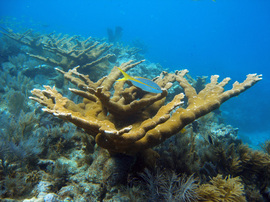 Acropora palmata. Photo: NOAA
Acropora palmata. Photo: NOAA
After a long divorce, the relationship between Cuba and the United States (U.S.) is entering a new chapter. The U.S.-Cuba trade embargo of 1962 has had large impacts on the Cuban economy. However, Cuba's isolation and attenuated coastal development and tourism has reduced human impacts on Cuban coral reefs. Additionally, the Cuban government has advocated significant marine resource protection dating back to the 1990s. This protection appears to have made a difference, and today many of the most pristine Caribbean coral reefs are found in Cuba.
As the United States and Cuba once again open a diplomatic dialogue, what will this mean for the state of Cuba's coral reefs? Will a normalizing of relationships between these two countries lead to reef degradation from coastal development, tourism, and overfishing, turning Cuba into its northern neighbor, Miami (no offense Miami...)? Personally, I've heard a lot of buzz about this topic with marine scientists concerned with coral reef conservation, as well as laypeople wanting to "see the reefs of the past before they are gone (again?)."
Well, some encouraging news... The New York Times ("Cuba and U.S. Agree to Work Together to Protect Marine Life") report that government agencies in the United States and Cuba will coordinate on coral reef conservation and the study of marine life in protected areas within the Florida Strait and the Gulf of Mexico. The agencies will be tasked with compiling shared ecosystem properties, species compositions, endangered species abundance, etc., among reef systems to better understand what makes Cuban reefs "unique." At a time when human impacts on reefs are substantial, the world could learn valuable lessons on reef conservation by studying Cuba and its management of marine resources. While intergovernmental collaboration may seem like a small step, remember that the relationship between these two Cold War enemies is complex, and any sign of thawing (get it, Cold War... thawing) is a harbinger of progress. Finally, it is important for the United States and Cuba to learn to work together--in science and in politics. Because while politically the two countries may remain polarized, science and conservation may serve as common ground for cooperation.
As the United States and Cuba once again open a diplomatic dialogue, what will this mean for the state of Cuba's coral reefs? Will a normalizing of relationships between these two countries lead to reef degradation from coastal development, tourism, and overfishing, turning Cuba into its northern neighbor, Miami (no offense Miami...)? Personally, I've heard a lot of buzz about this topic with marine scientists concerned with coral reef conservation, as well as laypeople wanting to "see the reefs of the past before they are gone (again?)."
Well, some encouraging news... The New York Times ("Cuba and U.S. Agree to Work Together to Protect Marine Life") report that government agencies in the United States and Cuba will coordinate on coral reef conservation and the study of marine life in protected areas within the Florida Strait and the Gulf of Mexico. The agencies will be tasked with compiling shared ecosystem properties, species compositions, endangered species abundance, etc., among reef systems to better understand what makes Cuban reefs "unique." At a time when human impacts on reefs are substantial, the world could learn valuable lessons on reef conservation by studying Cuba and its management of marine resources. While intergovernmental collaboration may seem like a small step, remember that the relationship between these two Cold War enemies is complex, and any sign of thawing (get it, Cold War... thawing) is a harbinger of progress. Finally, it is important for the United States and Cuba to learn to work together--in science and in politics. Because while politically the two countries may remain polarized, science and conservation may serve as common ground for cooperation.
 RSS Feed
RSS Feed